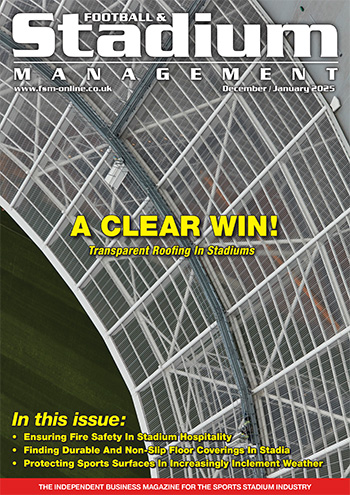How AI And Video Analytics Can Deliver A Winning Stadium Experience
 In this article, Chris Bishop, Marketing Director at Ipsotek, an Atos company, will discuss the changes to stadium security brought about by technology innovations in recent years and outline potential use cases for using AI to transform stadium safety without compromising on the matchday experience.
In this article, Chris Bishop, Marketing Director at Ipsotek, an Atos company, will discuss the changes to stadium security brought about by technology innovations in recent years and outline potential use cases for using AI to transform stadium safety without compromising on the matchday experience.
The sports industry, worth a whopping £23.8 billion in revenue and responsible for creating almost one million jobs, is a vital part of the UK economy. However, in 2020, the industry had to grapple with the effects of the Covid-19 pandemic, where every aspect of the sports industry was impacted – from the halting of games and empty stadiums to the furlough of many staff.
Not only does disruption to the industry affect the fan experience, but it also has a knock-on effect with other industries, including travel, retail tourism, infrastructure, transportation, and F & B. Therefore, being able to future-proof stadiums against similar obstacles while creating the ultimate fan experience is vital to the industry's continued success.
But how can club owners deliver a winning stadium experience whilst future-proofing their venues?
The Solution
Artificial intelligence (AI) has found its way into nearly every aspect of our lives – from healthcare to manufacturing – and sport is no exception. Today, AI is one of the core technologies businesses of all sizes are adopting to streamline their processes, reduce costs and create better experiences for their customers.
Stadiums are among the most vibrant and exciting of places, with thousands of people arriving and preparing for their big event. However, they are also one of the most challenging areas to manage and rely on collaboration between club owners, stadium staff, police forces, and other local authorities to ensure everyone's safety, well-being and security. According to venue security directors, security screening times, fan behaviour and staff retention are the top challenges stadium security faces.
However, innovative AI-based solutions such as A.I.V.A (Artificial Intelligent Video Analytics) can offer a more enhanced fan experience whilst addressing venues' security concerns. The technology can significantly enhance security across various area such as entrances, parking lots, dressing rooms, staff rooms, food & beverage outlets and queues – areas that are often hard to control manually.
It's essential to have a holistic view of all areas across a stadium in order to obtain an accurate picture of risks, threats and problems. A.I.V.A can be connected to existing CCTV cameras, and is capable of providing scenario-based and AI algorithms to determine behaviour and alerts automatically across multiple use-cases without capturing personal data.
This real-time capability allows operators and stadium staff to clarify the root cause of an incident and respond according to their stand operating procedures (“SOP’s”) and direct emergency or security staff to the scene, drastically reducing incident response times.
Similarly, the technology can generate data based on conditions at the scene, providing real-time insights into trends such as footfall and overcrowding. For example, during halftime at sporting events, thousands of people leave their seats to buy refreshments, use restrooms, and stretch their legs. At these points, overcrowding is almost guaranteed. A.I.V.A can automatically detect crowd density and flag locations where crushing may occur. Heatmaps can be generated to visually identify areas where crowding is occurring with colour coding to alert operators to the volume of people present. By enhancing security and safety through increasing situational awareness, staff can make informed decisions faster and more accurately.
Real-Time Insights And Information
A.I.V.A can also be used for facial recognition in say VIP areas, allowing faster entry and fewer wait times for loyal supporters and VIP guests, who accepted to share their personal data to benefit from a fast-track entry access. The technology can also be used where approved to detect troublemakers by automatically comparing faces to a known & approved watchlist by VIP & loyal supporters prior to individuals entering the stadium. The safety of players and coaches is also of paramount importance, and A.I.V.A. can be used to secure restricted access to locker rooms, practice facilities, weight rooms, cafeterias, sports medicine, recovery room, and VIP areas.
Monitoring areas outside a stadium or venue are as important as those inside. Using a combination of A.I.V.A. and other technologies such as IoT sensors and edge-based processing allows risks to be identified and managed dynamically. Security should not be a concern for those investing in the latest technology. Its reliability, versatility, and scalability can significantly help the industry succeed by ensuring venues are safe and secure and at the same time, provide a better fan experience.
Click the article to enlarge it.













































